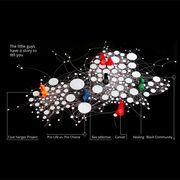Controversies are open, critical and creative situations, in which the social is reshuffled. They should not be confused with recurring conflicts among pre-existing actors with clearly defined values and interests. Controversies involve rather situations of shared uncertainty regarding an issue, opening up to discussion and redefinition fundamental features of the world, such as what is an entity, what is agency, what are the effects of actions, what is a fact or what is valuable.
The study of techno-scientific controversies is a distinctive feature of science and technology studies, as they provide unique opportunities to study the processes through which scientific knowledge and technological innovations are crafted. In the last years, controversy analysis has proved especially useful to study environmental policy, as well as urban development and architectural projects. In this seminar, we will review and discuss different analytical approaches and software tools to studying and mapping controversies.
Students will be required to present and discuss one reading, to identify and analyse one controversy and to summarize their findings in one final paper (and a poster presentation).
Key readings:
Marres, N. 2007. The Issues Deserve More Credit: Pragmatist Contributions to the Study of Public Involvement in Controversy. Social Studies of Science, 37(5), 759-780.
Venturini, T. 2010. Diving in magma: how to explore controversies with actor-network theory. Public understanding of science, 19(3), 258-273.
Whatmore, S. J. 2009. Mapping knowledge controversies: science, democracy and the redistribution of expertise. Progress in Human Geography, 33(5), 587 - 598.
Yaneva, A. 2011. Mapping Controversies in Architecture. Aldershot: Ashgate.
Wann
3. Juni, 18.Juni, 2. Juli
